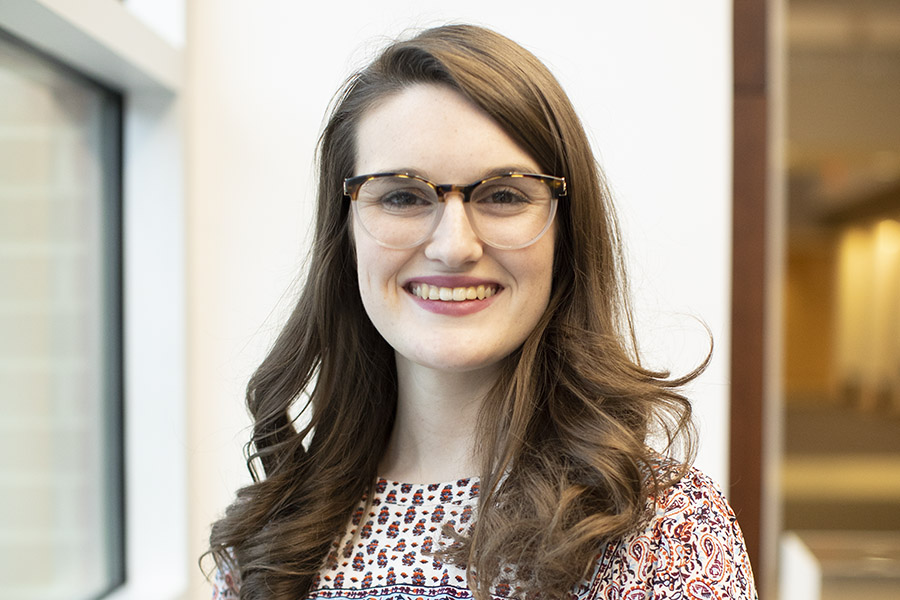Honors graduate targets Nashville’s tough issues through SALT capstone project
Meredith Crockett researched incarceration rates in Nashville as part of project recommending use of community courts in the state.
Janel Shoun-Smith | 615.966.7078 |

Meredith Crockett (’20), an Honors College alumna and the first president of the Honors Student Council in 2019-20, was among the 28 May graduates to earn Lipscomb University’s SALT Scholar status.
Through the SALT program (Serving And Learning Together), students who strive to become a SALT Scholar take designated service-learning courses, volunteer for campus-wide service activities and take on a service-oriented internship and a capstone project in their fields of study.
Earning such an honor does not come easy. The capstone projects of May’s SALT scholars involved serious societal issues ranging from domestic violence to wastewater treatment in underdeveloped nations.
Crockett’s SALT project focused on expanding access to community courts and pre-trial diversion programs in areas of Nashville with high incarceration rates. In 2020, Nashville’s 37208 zip code in North Nashville received media attention as it was noted as having the highest incarceration rate in the nation in a 2018 study from the Brookings Institution.
“The area saw a 14% incarceration rate among individuals born between 1980-1986, well above comparable areas across the country,” reported Nashville’s Tennessean newspaper in February.
“Part of what I hope to dispel with my project is that these areas are inherently more dangerous. They are not. This is just a really poor area that has been left out of the Nashville picture,” said Crockett, now a legal intake specialist in the Nashville office of Sanford Heisler Sharp. She has received a full Dean's Scholarship to begin her pursuit of a law degree at the University of Mississippi this coming fall.
Having already developed a strong interest and resume in advocacy for equity issues in high school and during her college career at Lipscomb, Crockett was selected for an internship at the office of Judge Rachel Bell, in Nashville’s General Sessions Court.
Bell was conducting research on community courts, as she was in the process of setting up Nashville’s Music City Court and CARE Community Court, specifically for those aged 18-26. She reached out to Lipscomb’s Fred D. Gray Institute for Law, Justice & Society to find research assistants.
Community courts are a subgroup of the court system that provides community resources and services to help people avoid prison time. The model is designed to circumvent the flaws of the court system which often traps the poverty-stricken, homeless and mentally ill in a cycle of being arrested, not being able to pay required fines and thus becoming incarcerated, and then being released into a society with even fewer prospects to improve their situation, said Crockett.
“We have 2.5 million people incarcerated in the U.S., and data show that poverty, race and mental illness are the main factors,” said Crockett. “The goal of the community court is to use the authority of judges to invest in communities.”
Tennessee already has some community courts operating within its counties. The Music City Court, established by Bell, Crockett’s mentor during her internship, was one of the first.
For her SALT capstone, Crockett chose to research best practices within existing community court systems around the world and make a recommendation of what kind of system would work for the entire state of Tennessee.
Among the best practices Crockett found among existing community court systems were community service mandates and expunging the defendant’s criminal record and the fine payments in an effort to give defendants a chance to improve themselves.
“I looked at systems around the world and recommended expanding the community court system into all the General Sessions Courts in Tennessee,” said Crockett.
Unlike county courts, the General Sessions Court system is the most flexible, has greater access to state welfare programs and already has experience requiring defendants to use resources like WIC, housing subsidies and social workers, she said.
“If we can start addressing—especially for young people—these crimes that aren’t really a threat to public safety, addressing how do they get to work, how do they keep their job. When you start addressing the root (of the defendants’ problems), then people stop committing crime,” Crockett said. “When you have people going to school and having access to good jobs, it creates mountains of benefit for the community.”